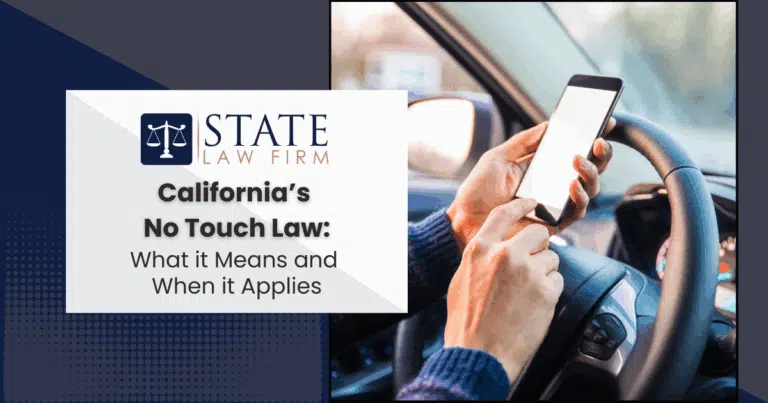California does not have a single statute called a “No Touch Law.”
In practice, the phrase refers to a web of criminal and civil rules that prohibit nonconsensual touching and protect personal boundaries at work, school, home, and in public.
This guide explains what those rules cover, when they apply, and what to do next if you need help.
Understanding California’s No Touch Law: An Overview
At the criminal level, California’s battery statute makes it a crime to willfully and unlawfully use force or violence against another person. The slightest touching is enough if done in a harmful or offensive way, and the touch can be indirect, such as causing an object to make contact.
Sexual battery is a separate crime. It involves touching another person’s intimate parts, against their will, for sexual arousal, gratification, or abuse. Depending on the specific facts, prosecutors can charge it as a misdemeanor or a felony.
On the civil side, a person who is touched without consent can sue for battery. California’s civil jury instructions require proof that the defendant intended the contact, that it was harmful or offensive, that the plaintiff did not consent, and that harm or offense resulted.
Workplaces have their own rules. California’s Fair Employment and Housing Act prohibits harassment, including unwanted touching, and obligates employers to prevent and correct it.
The Importance of Consent: Key Principles Behind the No Touch Law
Consent is the line between permitted and prohibited contact. In criminal cases, lack of consent turns a touch into a battery; in civil lawsuits, lack of consent is an essential element the plaintiff must prove. The Judicial Council’s civil instructions and California case law recognize consent as a defense to battery.
Expert insight: Consent must be specific to the contact at issue. Agreeing to a handshake is not consent to a hug. In professional settings, employers should train supervisors and staff on avoiding physical contact that can be perceived as coercive or sexualized. California’s state civil rights agency provides a concrete anti-harassment framework that employers can implement.
Pro tip: Put “no-touch” expectations in writing for your workplace, school, team, or club and review them during orientation and annual refreshers. Clear rules and reporting channels reduce risk and protect everyone.
When Does the No Touch Law Apply? Scenarios and Exceptions
Public and social settings. A shove in a crowd, grabbing a stranger’s arm, or throwing an object that hits someone can be a criminal battery even if there is no visible injury. The law focuses on the offensiveness of the contact, rather than the severity of the harm.
Workplaces. Unwanted touches from supervisors, coworkers, clients, or customers can be unlawful harassment under FEHA. Employers must take reasonable steps to prevent and promptly correct harassment.
Intimate or sexual situations. Touching intimate parts without consent for sexual purposes is sexual battery. The statute lists circumstances that can elevate penalties, such as restraint.
Home and family. Domestic violence laws allow courts to issue emergency and longer-term orders that forbid contact or require a person to stay away. These “no-contact” or “stay-away” orders are standard tools for safety planning.
Self-defense. Limited touching can be lawful if used reasonably to defend yourself or someone else from imminent harm. California’s jury instructions recognize self-defense as a complete defense where the force used was necessary and proportionate.
Expert insight: People often confuse assault and battery. Assault is an attempt to apply force, and it does not require physical contact. The battery requires the contact itself. Understanding the difference matters when evaluating charges and defenses.
Pro tip: If a situation escalates, create space and use clear verbal cues such as “Do not touch me.” If contact occurs, write down the details immediately while your memory is fresh.
Legal Consequences of Violating California’s No Touch Law
Criminal exposure. A simple battery can result in probation, classes, fines, and possible jail time. Sexual battery carries higher penalties, mandatory registration in some cases, and collateral consequences that affect work and licensure.
Civil liability. A victim can sue for damages, including medical bills, therapy costs, lost wages, and pain and suffering. The standard civil battery instruction lays out the elements plaintiffs must prove and guides juries on awarding damages.
Workplace remedies. Employees can file internal complaints, seek administrative relief with the California Civil Rights Department, or pursue a civil lawsuit for harassment—employers who fail to prevent or correct harassment risk significant liability.
Pro tip: Preserve evidence early. Save messages, badge logs, visitor lists, and any video footage. If there were witnesses, capture their names and contact information.
How to Protect Yourself Under the No Touch Law: Rights and Responsibilities
If you experienced unwanted touching:
- Get to a safe place and document what happened—note date, time, location, and witnesses.
- Seek medical care if needed and ask for photographs of any marks or injuries.
- Consider reporting to law enforcement or campus or workplace authorities.
- In urgent situations, you can ask a court for a temporary restraining order that prohibits contact and requires distance. Family Code section 6320 authorizes ex parte orders that stop contact and protect your peace.
If you are accused:
- Do not contact the other person. Preserve your own messages and potential video.
- Consult a lawyer before providing statements. There may be defenses like consent, mistaken identity, or self-defense supported by CALCRIM’s self-defense framework.
Criminal case vs. civil case. Many incidents involve both a police report and a civil claim for damages. The standards, timelines, and outcomes are different. For a quick primer, see State Law Firm’s resource, “Here’s How Personal Injury Lawsuits Differ from Criminal Cases.”
Expert insight: Even minor contact can satisfy criminal battery, but civil recovery still requires proof of harm or offense and lack of consent.
The same facts can lead to a misdemeanor plea in criminal court and a negotiated settlement in civil court.
The Future of Personal Space Laws: Trends and Predictions for California’s Legal Landscape
California’s jury instructions and agency guidance are updated regularly to reflect new case law and workplace realities.
Recent revisions to the CALCRIM and CACI publications show continued refinement around what counts as harmful or offensive touching, how consent is analyzed, and how juries should weigh evidence.
Employers are also seeing stricter expectations for prevention training and prompt investigations. Expect continued emphasis on bystander intervention, trauma-informed responses, and digital evidence, such as text messages and badge scans.
Takeaway: Quick Action Steps
- Set clear boundaries. Say “Please do not touch me” early and calmly.
- Document immediately. Write what happened and save the messages or video.
- Get help—report to HR, the Title IX office, or the police, as appropriate.
- Consider protective orders. Courts can quickly issue no-contact orders to stop further contact.
- Talk to counsel. An attorney can coordinate any criminal investigation with your civil options and preserve your claims. For a side-by-side view of procedures, evidence, and outcomes, read Here’s how personal injury lawsuits differ from criminal cases.
Navigating Personal Boundaries with Confidence Under California’s No Touch Law
“No touch” is really about consent and respect, backed by clear legal rules. California criminalizes harmful or offensive contact, provides civil remedies for victims, and requires workplaces to prevent and correct harassment. If you have questions about your situation or need help taking the next step, State Law Firm is ready to listen, evaluate the facts, and protect your rights.


